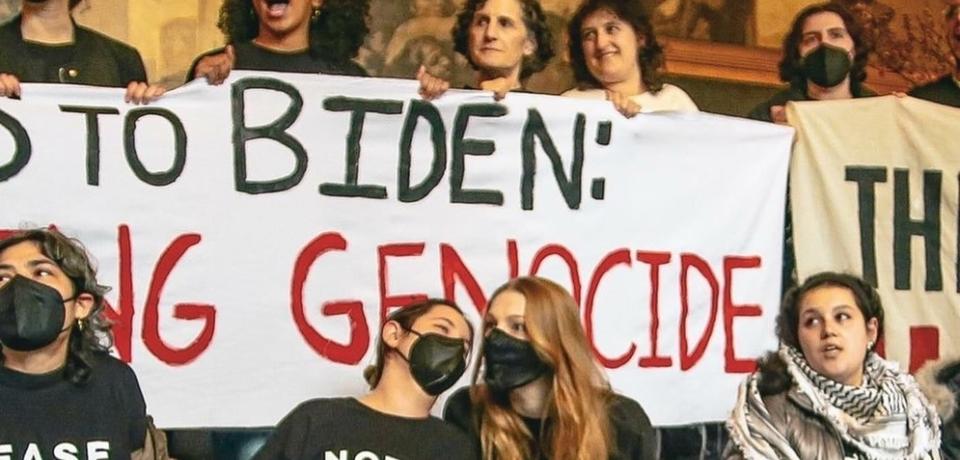
How odd to speak of a movement of the uncommitted. But at the moment in states such Michigan and Washington, the uncommitted are the vanguard of a political movement in defense of the Palestinian people from Israel’s genocidal war whose weapons are supplied by the United States. The horror of 30,000 dead in Gaza, half of them women and children, and the events such as the Israel’s provocation of a stampede of 120 people shot or trampled attempting to get food from trucks in a humanitarian aid convoy, are fueling a powerful movement for a ceasefire and an end to U.S. military aid to Israel.
Michigan has 200,000 Muslim voters, and counting another way, it has 300,000 voters from the Middle East and North Africa. Starting a couple of months ago, Palestinians in Michigan began to organize a movement urging voters in the state’s Democratic primary election to cast their votes for “uncommitted” rather than for President Joe Biden as a protest against his failure to call for a ceasefire. “In a democracy you are told when things are not going right, you use the ballot box to send your message,” said Michigan State Representative Abraham Aiyash, a supporter of the campaign.
The Michigan uncommitted movement hoped to convince 10,000 people to do so in the presidential primary on February 27, but it won support not only from the Arab and Muslim communities, but also from some Jews, like those in Jewish Voice for Peace, from African Americans, and from young voters of various ethnicities and eventually received 100,000 votes. The Israel newspaper Haaretz reported that Michigan campaign manager Layla Elabed – Rep. Rashida Tlaib’s sister – said the results will likely mean “Michigan will be sending two delegates to Chicago to declare that they are uncommitted to the Democratic nominee as long as he or she funds Israel’s war in Gaza.”
Michigan, a swing state, is key to the U.S. presidential election. In the last election, Biden won Michigan by only 150,000 votes, so if Muslims and Arabs stay home, he could lose the state.
In Washington state, where the primary election will take place on March 12, there is another strong movement of the uncommitted. There the United Food and Commercial Workers Union, which has 50,000 members in the state, called upon its members to vote uncommitted. The UFCW praised Biden for being “an ally to workers over the years,” but said, “in solidarity with our partners in Michigan who sent a clear message in their primary that Biden must do more to address the humanitarian crisis in Gaza. Biden must push for a lasting ceasefire and ending US funding toward this reckless war.”
Washington state is predominantly Democratic and the union and other uncommitted voters are likely to vote for Biden in the general election, but many want to register their opposition to his policies. Still, the presence of a bloc of uncommitted delegates could affect the Democratic Party national convention where the presidential candidate is nominated.
Not all states offer the option of voting uncommitted, but there are several that do, including Kentucky, Maryland, Rhode Island, Tennessee, and Colorado. Most of those have small Arab and Muslim populations, and some like Colorado have campaigns to win uncommitted votes and perhaps delegates.
The movement in the streets also continues. On March 2, an International Day of Solidarity with Palestine, hundreds of thousands around the world demonstrated for a ceasefire. We marched in 85 American cities, including Los Angeles, Denver, Chicago, and in rainy New York City where I joined the protest. As long as the war goes on, the movement will go on, and the opposition to both Israel and to United States support for the war will grow.
3 March 2024